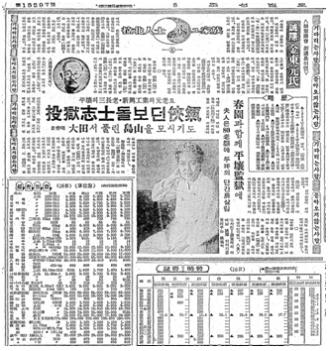Name: admin
2014-01-02 15:43:45 | Hit 5891
Abductees and their families (6)
Those who wait, those who never came back
Constitutional Assembly Vice Speaker, Seongeun Kim Dong-won
P.4, Chosun Daily, Jul. 17, 1964
When he arrived at Seoul Station, the train had already left for the south. Seongeun Kim Dong-won was Vice Speaker of the Constitutional Assembly and the owner of a large conglomerate, which made him the financial backbone of the Independence Movement.
He went to a public official's house to flee the war, but the official was scared and coldly turned him away. He wandered around empty storage in the Euljiro area for ten days, until a relative hid him in a match factory in Anam-dong.
Meanwhile, armed Communist soldiers barged into the house of Seongeun's son-in-law, Kim Byeong-gi (Director of the Korean Fine Arts Association), and threatened him,demanding to know where Seongeun was hiding. His daughter, Sun-hwan (47), later said, sadly, that it was then that his grandchildren, who were 2~3 years old, learned to hold up their hands in front of guns.
His daughter knew that her father's life was in danger. So she came up with a plan to get him out of Seoul. Her plan was to get a jacket made of hemp and disguise her father as a man selling rice. She herself would wear a kerchief on her head, and with her child they would escape. But when she arrived at the factory the next day, disguised as planned, Seongeun was already gone. An informant had betrayed him. Afterwards, it was said that he had been taken away to a prison in Pyongyang, packed in a truck like animals with Mrs. Hwang Sin-deok, Kim Hyo-seok, the then Minister of Home Affairs, and three French nuns. Seongeun shared a cell with Chunwon Lee Gwang-su, and it was said that he had a very bad dry cough.
Imprisoned with Chunwon,
His wife an 80 year old lady living in a small single room
There were reports that he was gathering woods in a mountain in Jagang Province with Jo Heon-yeong (a former member of the National Assembly). When Pyongyang was retaken, it was reported that he was living there with Jo Myeon-sik, so his son-in-law, a military painter, went there to look for him, but could not find him. Seongeun's oldest son, Myeong-hwan (59), has passed away, and Seong-hwan (50), who used to be a public official, has lost the will to live due to the shock of the Korean War. His oldest daughter, Sun-hwan (47), who was closest to him, is married to Edward Housman, a pianist who recently had a concert in Korea, and is now living in the U.S. with two sons.
His wife, Park Dong-bok (87), who used to be the mistress of a large house with a floor space of 330sq. meters and more than 50 houseguests, is now living with her oldest daughter-in-law in a small single room in Guro-dong, Youngdeungpo, in Seoul. The oldest granddaughter, who used to put up her hands in front of guns, is now a college graduate.
Seongeun used to be one of "Pyongyang's three elders," along with Jo Myeon-sik and O Yun-seon. He was a veteran of Korea's new manufacturing industries, such as rubber, automobiles, knitwear, and oil. He was put in jail during Japanese colonial rule because he was the Pyongyang representative of the Soo-yang Association. When he got out, he hired the famous Japanese attorney, Suzuki, who served as Chief of the Criminal Affairs Bureau of the Justice Ministry in Japan.
Thanks to Suzuki's famous defense, Seongeun's friends were freed from jail. When his friends got out of jail and found themselves with no money, Seongeun gave them tens of businesses and put them in executive positions to help them make a living. After the Liberation many people became people of influence in the political and business arena, and many of them were once under Seongeun's care.
Courageous man who took care of imprisoned patriot
Supported Dosan when he got out of jail in Daejeon
When Dosan was released from jail for medical reasons and had nowhere to go, Seongeun personally took him in. When Dosan arrived at Pyongyang Station, a large crowd had formed to cheer him and welcome him back. Seongeun personally went to the station, stood on top of cars and slowly escorted Dosan to his house. This was the most memorable event that Seongeun's daughter can recall. Dosan had made a dish out of paper while he was in jail and had treasured it like a family heirloom, but itdisappeared during the Korean War.
Sun-hwan remembers her father saying, "It is more difficult to repay debt than be in someone's debt." She also remembers that he lived a hard life in which he helped so many people, but no one paid him back, and he spent most of his time in jail.
<Seongeun Kim Dong-won's Profile>
▲1884= Born in Pyongyang (Brother: writer Kim Dong-in) ▲1906= Went to Meiji University, majored in Law ▲1909= Founded and worked as a Principal at Daeseong University, Sungdeok School, Soongsil Women's School, and Sungin School ▲1910= Created Pyongyang YMCA and was the Head for 30 years ▲1912= The head of New People's Association in Pyeongyang. Spent 3 years in prison for being involved in the 105 People Incident ▲1919= Headed the Provisional Government’s Pyongyang branch ▲1923= The Board President for 4 schools, including Soongsil College ▲1937= Spent 2 years in jail due to the Young Korean Academy incident ▲1945= Became the floor leader of Hanmin Party and Advisor of military governor▲1950= Elected as member of Constitutional Assembly at Yongsan, Seoul, and became the Constitutional Assembly’s Vice Speaker
Those who wait, those who never came back
Constitutional Assembly Vice Speaker, Seongeun Kim Dong-won
P.4, Chosun Daily, Jul. 17, 1964
When he arrived at Seoul Station, the train had already left for the south. Seongeun Kim Dong-won was Vice Speaker of the Constitutional Assembly and the owner of a large conglomerate, which made him the financial backbone of the Independence Movement.
He went to a public official's house to flee the war, but the official was scared and coldly turned him away. He wandered around empty storage in the Euljiro area for ten days, until a relative hid him in a match factory in Anam-dong.
Meanwhile, armed Communist soldiers barged into the house of Seongeun's son-in-law, Kim Byeong-gi (Director of the Korean Fine Arts Association), and threatened him,demanding to know where Seongeun was hiding. His daughter, Sun-hwan (47), later said, sadly, that it was then that his grandchildren, who were 2~3 years old, learned to hold up their hands in front of guns.
His daughter knew that her father's life was in danger. So she came up with a plan to get him out of Seoul. Her plan was to get a jacket made of hemp and disguise her father as a man selling rice. She herself would wear a kerchief on her head, and with her child they would escape. But when she arrived at the factory the next day, disguised as planned, Seongeun was already gone. An informant had betrayed him. Afterwards, it was said that he had been taken away to a prison in Pyongyang, packed in a truck like animals with Mrs. Hwang Sin-deok, Kim Hyo-seok, the then Minister of Home Affairs, and three French nuns. Seongeun shared a cell with Chunwon Lee Gwang-su, and it was said that he had a very bad dry cough.
Imprisoned with Chunwon,
His wife an 80 year old lady living in a small single room
There were reports that he was gathering woods in a mountain in Jagang Province with Jo Heon-yeong (a former member of the National Assembly). When Pyongyang was retaken, it was reported that he was living there with Jo Myeon-sik, so his son-in-law, a military painter, went there to look for him, but could not find him. Seongeun's oldest son, Myeong-hwan (59), has passed away, and Seong-hwan (50), who used to be a public official, has lost the will to live due to the shock of the Korean War. His oldest daughter, Sun-hwan (47), who was closest to him, is married to Edward Housman, a pianist who recently had a concert in Korea, and is now living in the U.S. with two sons.
His wife, Park Dong-bok (87), who used to be the mistress of a large house with a floor space of 330sq. meters and more than 50 houseguests, is now living with her oldest daughter-in-law in a small single room in Guro-dong, Youngdeungpo, in Seoul. The oldest granddaughter, who used to put up her hands in front of guns, is now a college graduate.
Seongeun used to be one of "Pyongyang's three elders," along with Jo Myeon-sik and O Yun-seon. He was a veteran of Korea's new manufacturing industries, such as rubber, automobiles, knitwear, and oil. He was put in jail during Japanese colonial rule because he was the Pyongyang representative of the Soo-yang Association. When he got out, he hired the famous Japanese attorney, Suzuki, who served as Chief of the Criminal Affairs Bureau of the Justice Ministry in Japan.
Thanks to Suzuki's famous defense, Seongeun's friends were freed from jail. When his friends got out of jail and found themselves with no money, Seongeun gave them tens of businesses and put them in executive positions to help them make a living. After the Liberation many people became people of influence in the political and business arena, and many of them were once under Seongeun's care.
Courageous man who took care of imprisoned patriot
Supported Dosan when he got out of jail in Daejeon
When Dosan was released from jail for medical reasons and had nowhere to go, Seongeun personally took him in. When Dosan arrived at Pyongyang Station, a large crowd had formed to cheer him and welcome him back. Seongeun personally went to the station, stood on top of cars and slowly escorted Dosan to his house. This was the most memorable event that Seongeun's daughter can recall. Dosan had made a dish out of paper while he was in jail and had treasured it like a family heirloom, but itdisappeared during the Korean War.
Sun-hwan remembers her father saying, "It is more difficult to repay debt than be in someone's debt." She also remembers that he lived a hard life in which he helped so many people, but no one paid him back, and he spent most of his time in jail.
<Seongeun Kim Dong-won's Profile>
▲1884= Born in Pyongyang (Brother: writer Kim Dong-in) ▲1906= Went to Meiji University, majored in Law ▲1909= Founded and worked as a Principal at Daeseong University, Sungdeok School, Soongsil Women's School, and Sungin School ▲1910= Created Pyongyang YMCA and was the Head for 30 years ▲1912= The head of New People's Association in Pyeongyang. Spent 3 years in prison for being involved in the 105 People Incident ▲1919= Headed the Provisional Government’s Pyongyang branch ▲1923= The Board President for 4 schools, including Soongsil College ▲1937= Spent 2 years in jail due to the Young Korean Academy incident ▲1945= Became the floor leader of Hanmin Party and Advisor of military governor▲1950= Elected as member of Constitutional Assembly at Yongsan, Seoul, and became the Constitutional Assembly’s Vice Speaker






















 FAX : (82)31-930-6099
FAX : (82)31-930-6099
